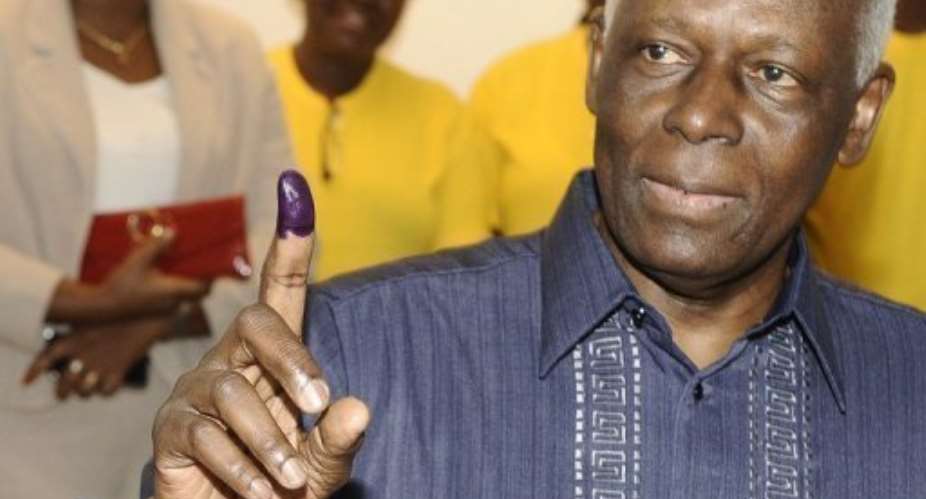LUANDA (AFP) - President Jose Eduardo dos Santos was poised to extend his 33-year rule Saturday as his party took a hefty lead in the election count, despite frustrations among the poor at being left out of Angola's oil boom.
With 68 percent of the vote counted, his People's Movement for the Liberation of Angola (MPLA) had 74 percent of the vote from Friday's general elections.
The main opposition Union for the Total Independence of Angola (Unita) was a distant second with nearly 18 percent, and the new Casa party was third with 4.6 percent, the National Electoral Commission said.
In Luanda, the opposition fared better. The MPLA took 57 percent in the capital, with 27 percent for Unita and 12 percent for Casa. Only one-third of the vote in the city has been counted.
Angolans voted Friday for 220 members of parliament, with the leader of the winning party receiving a five-year term as president. More results are expected later Saturday.
Counting began shortly after polls closed Friday, and the process was proceeding faster than expected.
With Angolans waiting anxiously for the results, newspaper vendors were mobbed as soon as Saturday's editions hit the streets.
Otherwise the normally vibrant capital Luanda was strangely quiet for a second day. Friday was declared a national holiday for the elections, and shops remained shuttered on Saturday. Streets normally notorious for gridlock were mostly empty.
The MPLA, in power since independence from Portugal in 1975, took 81 percent of the vote in the last elections in 2008, the first ballot held after the 27-year civil war ended in 2002.
Dos Santos has already ruled Angola for 33 years, through the devastating civil war and then through an oil boom that over the last decade has transformed the country into one of the world's fastest growing economies.
While his family has built a business empire, he has also ploughed billions of dollars into rebuilding the nation with new roads, schools, bridges and dams rising up from the ruins.
Public health and incomes have improved, but just over half of the country still lives in abject poverty, often in shacks without electricity or running water.
Resentment among young Angolans, as luxurious new skyscrapers fill Luanda's skyline, has sparked protests demanding that Dos Santos step down and calling for the nation's oil wealth to be spread more evenly.
Protests in Angola are quickly and violently repressed, but they have clearly rattled a government that never allows any show of dissent.
Unita accuses Dos Santos of using his power and money to strengthen his control over the state, and in its campaign promised a better democracy.
Party leader Isaias Samakuva lambasted the organisation of the elections, citing worries about accreditation of observers and the failure to make a public audit of the 9.7 million names on the voter roll.
Having won only 10 percent of votes in the last poll, Unita needs a strong showing to prove it remains relevant.
Its new challenger is the the new Casa party, formed after a bruising split that saw one of its top party officials join forces with a high-profile defector from the MPLA.
Casa appears to have made in-roads among young voters with promises of better jobs and homes since its creation in April.
"The MPLA will be the winner of the elections, but it is going to have to address the dissenters over the next five years," said Bango Serra, of the Angolan civic group Justice, Peace and Democracy.
"This dissent will first centre on the results, because of doubts about the organisation of the polls, then on the party's social policies," he said.
Former Cape Verde president Pedro Verona Pires, chief of the African Union's observer team, described the poll's organisation as "satisfactory" and said initial reports showed voting had proceeded well.
In 2008, chaos at the polls forced the government to allow a second day of voting. Friday's balloting appeared to have gone smoothly, and police in Luanda said no incidents had been reported.





 Tuesday’s downpour destroys ceiling of Circuit Court '8' in Accra
Tuesday’s downpour destroys ceiling of Circuit Court '8' in Accra
 SOEs shouldn't compromise on ethical standards, accountability – Akufo-Addo
SOEs shouldn't compromise on ethical standards, accountability – Akufo-Addo
 Father of 2-year-old boy attacked by dog appeals for financial support
Father of 2-year-old boy attacked by dog appeals for financial support
 Jubilee House National Security Operative allegedly swindles businessman over sa...
Jubilee House National Security Operative allegedly swindles businessman over sa...
 Nobody can order dumsor timetable except Energy Minister – Osafo-Maafo
Nobody can order dumsor timetable except Energy Minister – Osafo-Maafo
 Mahama wishes National Chief Imam as he clock 105 years today
Mahama wishes National Chief Imam as he clock 105 years today
 J.B.Danquah Adu’s murder trial: Case adjourned to April 29
J.B.Danquah Adu’s murder trial: Case adjourned to April 29
 High Court issues arrest warrant for former MASLOC Boss
High Court issues arrest warrant for former MASLOC Boss
 Align academic curriculum with industry needs — Stanbic Bank Ghana CEO advocates
Align academic curriculum with industry needs — Stanbic Bank Ghana CEO advocates
 Election 2024: We'll declare the results and let Ghanaians know we've won - Manh...
Election 2024: We'll declare the results and let Ghanaians know we've won - Manh...
